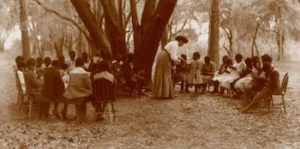
Laura Towne and students
*The founding of the Penn Normal, Industrial, and Agricultural School in 1862 is celebrated on this date.
Penn Center School (as it was called) was the first school for Blacks on the Island of St. Helena, South Carolina. Laura Towne and Ellen Murray were its founders. Towne came to S. C. to work as a nurse, and in 1882, Murray arrived. The two of them began working on improving the island's educational situation.
They opened their first schoolhouse on the Oaks plantation and later moved to the Brick Church in the center of St. Helena. In 1901, the school was chartered as the Penn Normal, Industrial, and Agricultural School. Named for the Quaker activist William Penn, it operated for eighty-six years as a Normal, Agricultural, and Industrial training school for Black people.
In the early part of the 20th century, the courses sought ways to be more useful for people on the island. They decided that Penn needed to offer various training programs for several crafts so the students attending could find work. Penn decided that their goals were most similar to the principles of Booker T. Washington and his push toward an Industrial-centered curriculum. They incorporated classes in carpentry, wheel writing, basket making, harness making, cobbling, and mechanics. The school also instructed midwifery and teacher training.
The Penn Center assisted the needs of the Low Country community and the Penn Center students. It offered several classes open to the community, such as quilting and weaving. It was also dedicated to children's public service work. It set up the Farmer's clubs and the Patron's Leagues, and students training to be nurses taught classes in health across the island.
In the 1940s, Penn Center experienced several setbacks that aided in its final decision to close its charter. Several storms and natural disasters destroyed that land in South Carolina. The boll weevil epidemic proved to be too much for many of the farm laborers to overcome. People could no longer be sure they could grow enough of a crop to provide for their families, let alone make a profit.
Millions of people gave up and went north. It was tough for Penn to keep their enrollment up during the Great Migration. It became almost impossible to keep subjects constant; they were losing funding, and it was becoming increasingly difficult to stay open. In 1948, the Penn School Board decided that it would not remain open as a private school but would serve the community, actively providing public education to the Sea Island people. The name was changed to Penn Community Services in 1950. Over the years, with continuing philanthropic support, it served as a school, health agency, and cooperative society for the Sea Islands' rural Blacks.